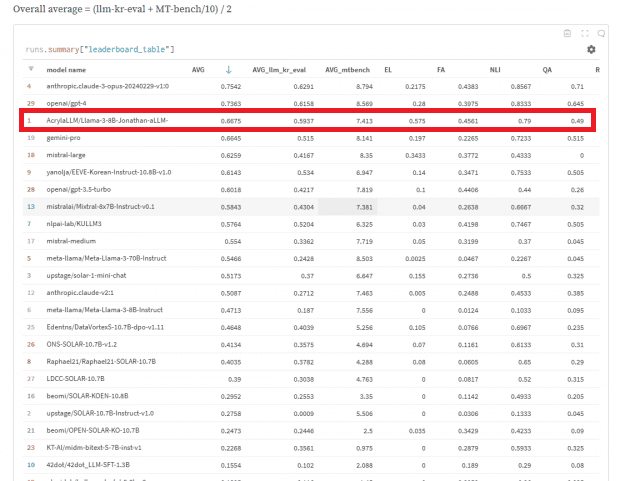A-LLM: Korean Large Language Model based on Llama-3
Introduction
A-LLM is a Korean large language model built on Meta's Llama-3-8B architecture , specifically optimized for Korean language understanding and generation. The model was trained using the DoRA (Weight-Decomposed Low-Rank Adaptation) methodology on a comprehensive Korean dataset , achieving state-of-the-art performance among open-source Korean language models.
Performance Benchmarks
Horangi Korean LLM Leaderboard
The model's performance was evaluated using the Horangi Korean LLM Leaderboard , which combines two major evaluation frameworks normalized to a 1.0 scale and averages their scores.
1. LLM-KR-EVAL
A comprehensive benchmark that measures fundamental NLP capabilities across 5 core tasks:
- Natural Language Inference (NLI)
- Question Answering (QA)
- Reading Comprehension (RC)
- Entity Linking (EL)
- Fundamental Analysis (FA)
The benchmark comprises 10 different datasets distributed across these tasks , providing a thorough assessment of Korean language understanding and processing capabilities.
2. MT-Bench
A diverse evaluation framework consisting of 80 questions (10 questions each from 8 categories) , evaluated using GPT-4 as the judge. Categories include:
- Writing
- Roleplay
- Extraction
- Reasoning
- Math
- Coding
- Knowledge (STEM)
- Knowledge (Humanities/social science)
Performance Results (documented on 10/04/24)
| Model | Total Score | AVG_llm_kr_eval | AVG_mtbench |
|---|---|---|---|
| A-LLM (Ours) | 0.6675 | 0.5937 | 7.413 |
| Mixtral-8x7B | 0.5843 | 0.4304 | 7.381 |
| KULLM3 | 0.5764 | 0.5204 | 6.325 |
| SOLAR-1-mini | 0.5173 | 0.37 | 6.647 |
Our model achieves the highest performance among open-source Korean large language models, showcasing exceptional capabilities in both general language understanding (LLM-KR-EVAL) and diverse task-specific applications (MT-Bench). Additionally, it surpasses similarly scaled models with sizes below approximately 10 B parameters.
Model Components
This repository provides:
- Tokenizer configuration
- Model weights in safetensor format
Usage Instructions
from transformers import AutoModelForCausalLM, AutoTokenizer
import torch
# Load tokenizer and model
model_path = "AcrylaLLM/Llama-3-8B-Jonathan-aLLM-Instruct-v1.0"
tokenizer = AutoTokenizer.from_pretrained(model_path)
model = AutoModelForCausalLM.from_pretrained(
model_path,
torch_dtype=torch.float16,
device_map="auto"
)
# Example prompt template
def generate_prompt(instruction: str, context: str = None) -> str:
if context:
return f"""### Instruction:
{instruction}
### Context:
{context}
### Response:"""
else:
return f"""### Instruction:
{instruction}
### Response:"""
# Example usage
instruction = "다음 질문에 답변해주세요: 인공지능의 발전이 우리 사회에 미치는 영향은 무엇일까요?"
prompt = generate_prompt(instruction)
# Tokenize and generate
inputs = tokenizer(prompt, return_tensors="pt").to(model.device)
outputs = model.generate(
**inputs,
max_length=512,
temperature=0.7,
top_p=0.9,
repetition_penalty=1.2,
do_sample=True
)
response = tokenizer.decode(outputs[0], skip_special_tokens=True)
print(response)
Generation Settings
# generation parameters
generation_config = {
"bos_token_id": 128000,
"do_sample": True,
"eos_token_id": 128001,
"max_length": 4096,
"temperature": 0.6,
"top_p": 0.9,
"transformers_version": "4.40.1"
}
# Generate with specific config
outputs = model.generate(
**inputs,
**generation_config
)
Prerequisites
- Python 3.8 or higher
- PyTorch 2.0 or higher
- Transformers library
Acknowledgement
The authors thank the following contributors and projects.
- This work was supported by Institute of Information & communications Technology Planning & Evaluation (IITP) grant funded by the Korea government(MSIT) (2022-0-00043, Adaptive Personality for Intelligent Agents).
- This work was supported by Institute of Information & communications Technology Planning & Evaluation (IITP) grant funded by the Korea government(MSIT) (RS-2023-00228255, PIM-NPU Based Processing System Software Developments for Hyper-scale Artificial Neural Network Processing).
License
Please refer to the model card on HuggingFace for licensing information.
- Downloads last month
- 536
